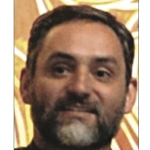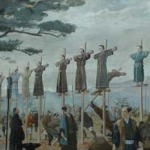or “Why ‘the Way’ will fail in Asia”
Another recording has been secretly smuggled out of the castle…Listen to what Fr. Edwin “Pius” Sammut O.C.D, the lead catechist for “the Way” in Guam, and another speaker told members during their recent “Beginning of the Year” Convivence in Guam about the Way’s troubles in Japan. (click on the orange circle to play):
Here is a transcript of what was said during the introduction of Kiko Arguello’s new song:
Unknown speaker:
“In June of this year Kiko went to Japan to visit the communities, the families, the brothers there. And I don’t know if you’ve heard, but there was this situation there a couple of years ago when the Episcopal Conference of Japan basically kicked out the brothers from the parishes and basically banned the Way. And it was, uh, an unusual situation because when the Pope heard about it he called the bishops – it was Benedict XIV at the time – and he was saying, “Look, you know, you cannot do it.” Yeah, yeah, he called, he called them to Rome and had a meeting with them, and was saying, “No, this cannot be, you know, I…it’s a gift from God, this Way, for the Church today.” But anyway, the Bishops, they didn’t obey they still did that, they banned the Way. So Kiko when he went there to see the brothers, he…yeah…a clarification.”
Fr. Pius steps in to “clarify”:
“Now what happened was very simple, okay. The Bishops of Japan, which are very very territorial, okay, they saw that in ??? Way, they judged it as being too European. Therefore, they decided to you know, to stop it. And in Japan it’s very important, you know, that they look united. They are not united, but that they look united. But there were some bishops that were against this. They liked the Way, they were in favor of the Way, and therefore, however, for the sake of appearing united, of looking as a united front, they decided to take this decision. For five years the brothers cannot meet in the Church. No one can prohibit anyone from meeting, you know, I can meet in homes, and can go and study the scriptures in the homes, this is a right of every Christian. You know, that no one can take away this right. Therefore, okay, the brothers continue, but they are meeting in the homes. They cannot have a Eucharist because the Eucharist is a liturgy, therefore, you know, therefore they cannot because the Bishops don’t want. So for five years they were put on quarantine. You cannot meet, you cannot have a celebration in the Church. This as you can imagine created tremendous suffering, okay. But the brothers did what they were told. They obeyed, they did not make any protests, they did not go to the FBI, you know, they just, they just obeyed. They just did what they were told. And Kiko went to visit them, because of…what he is saying ?? is this, they basically disobeyed the Pope, eh, it’s a very serious thing. Because the Pope told them explicitly, Pope Benedict, “Don’t do it. Don’t do it.” And they decided to do it. So it’s a very clear disobedience. But they have their conscience and they sit in front of God. But for you to know the facts.”
First speaker again:
The point is, that eh, he [Kiko] went there for you know, these brothers who are suffering as Father said. He [Kiko] put music to words of a martyr from the fourth century who was martyred in the persecution of Diocletian, Vittorino, Saint Vittorino.
In their description of the problems facing members of “the Way” in Japan, Fr. Sammut and his friend twist the truth in four ways.
First, members of “the Way” in Japan are not suffering, and they are not being “persecuted”. Our Christian brothers in Iraq are suffering and are being persecuted. Certain members of “the Way” in Japan have merely been inconvenienced in those dioceses where “the Way” is still not established, and comparing their inconvenience to the suffering of the martyrs under Diocletian is an outrageous lie.
Second, members of “the Way” in Japan are not excluded from “the Eucharist.” The celebration of the Eucharist, albeit not always in the fashion of “the Way”, is still accessible to them in their parishes, and Christ is present Body, Soul, and Divinity in the Blessed Sacrament and in each of those celebrations.
Thirdly, while the original nation-wide suspension of “the Way” by

the Episcopal Conference of Japan was to last five years, it in fact, did not. It lasted only a few weeks. Not only that, but the Neocatechumal Fr. Santiago Flor Caravia, formerly the pastor of Our Lady of Peace and Safe Journey Chalan Pago, Guam, is serving there now!
Lastly, the bishops of Japan are not “disobedient”. The first speaker told the members “brothers”, that the Japanese bishops “didn’t obey”, and Fr. Pius said that the bishops’ actions were a “clear disobedience” and “they basically disobeyed the Pope”. In truth, the Bishops of Japan are either welcoming “the Way” in their respective dioceses or they are not, but they are doing so pursuant to the Statutes of the Neocatechumenal Way!
Here is a summary of the facts:
- Archbishop Peter Takeo Okada of Tokyo spoke to the Pope in December 2007 about the problems the Way was causing in Japan. He described the Way’s presence in Japan’s small Catholic community as “a serious problem.” The “powerful sect-like activity of Way members is divisive and confrontational,” and has caused “sharp, painful division and strife within the Church,” he told the Pope.
- In 2009, the Catholic Bishops’ Conference of Japan (CBCJ) successfully got the seminary and its rector, Mgr Peter Hirayama, moved to Rome.
- The CBCJ imposed a 5-year suspension on the activities of the Neocatechumenal Way in late 2010. “At the end, after the five years,” said Archbishop Joseph Mitsuaki Takami of Nagasaki, “we

The 26 Martyrs of Nagasaki will be ready to discuss things with them. We don’t want them to leave and never come back. No, no. We want them to work in a way that we would like, for that they will have to learn the Japanese language and particularly Japanese culture.“
- In December of 2010, just a few weeks after the bishops suspended “the Way” in Japan, Pope Benedict XVI brought five Japanese bishops together with Cardinal Stanisław Ryłko, president of the Pontifical Council for the Laity, Cardinal Ivan Dias, prefect of Propaganda Fide, Cardinal William Levada, prefect of the Congregation for the Doctrine of the Faith, and Cardinal Antonio Cañizares, prefect of the Congregation for Divine Worship and the Discipline of the Sacraments.
- The Pope rescinded the nation-wide suspension, and he encouraged dialog between the Way and the Japanese bishops, with the help of an official delegate. So now there is no blanket suspension of “the Way” in Japan, bishops there are free to welcome “the Way” into their dioceses, and there is no public indication that the dialog has ceased.
- Based on the statutes of the Neocatechumenal Way, local bishops are free to decide the future of the movement’s activities in their dioceses. Statutes, Art. 1, Art. 26:
- Art. 1, § 2. “The Neocatechumenal Way is at the service of the bishop as one of the forms of diocesan implementation of Christian initiation and of ongoing education in faith. “
- Art. 26, “It pertains to the diocesan bishop, as responsible for initiation, formation and Christian life in the local Church: 1st. to authorize the implementation of the Neocatechumenal Way in the diocese; “
So that’s the truth of the matter. There has been no “disobedience” on the part of the Japanese bishops, and the continuing lies told by the Neocatechumenal Way does not bode well for their success in Japan, or any other Asian country.
References
- Most Rev Peter Takeo Okada, Archbishop of Tokyo: http://www.indcatholicnews.com/news.php?viewStory=17613
- http://www.asianews.it/news-en/Pope-reverses-five-year-suspension-of-Neocatechumenal-Way-in-Japan-20475.html
- http://www.catholicnewsagency.com/news/japans-bishops-want-neocatechumenal-way-to-leave-for-five-years/
- http://www.ucanews.com/news/bishop-speaks-out-on-neo-cats/356
- The Statutes of the Neocatechumenal Way: http://www.camminoneocatecumenale.it/public/file/en_Statute2008.pdf
- Fr. Santiago Flor Caravia is serving in Japan: http://umatuna.org/four-diocesan-priests-go-to-the-mission
- The suspension lasted only a few weeks: http://www.zenit.org/en/articles/neocatechumenal-way-will-not-be-suspended-in-japan

If only most American and European bishops had the courage of their Asian brethren maybe we would see the demise of the Neocatechumenate…as far as I’m concerned it couldn’t happen soon enough!